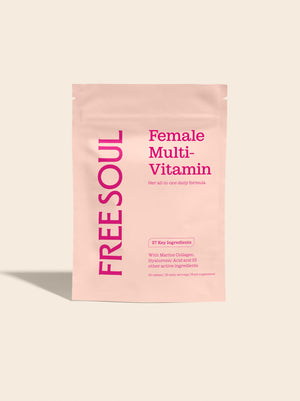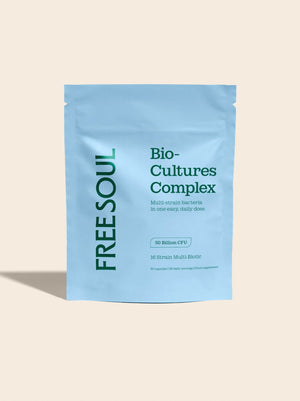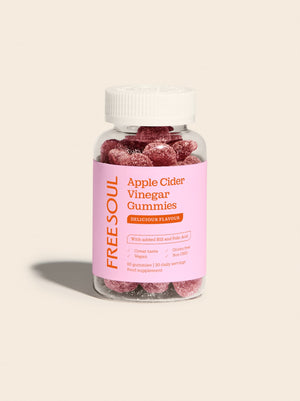…according to our resident registered nutritionist, Harriet Well. As more and more of us navigate social media to consume and share food and nutrition information, it’s important to know what’s actually fact and what’s just the next fad. At Free Soul we’re focused on helping you become the best version of yourself by creating simple, consistent and healthy habits that improve your wellness as a woman. We’re so not here for the myths, toxic habits and damaging diet culture, and Harriet’s breaking down everything you need to know.
As a nutritionist, I am constantly noticing how much misinformation and fad diets we are bombarded with, all promising quick fixes and results, but sadly these can often do more harm than good without the right knowledge and education. While there are many things that I recommend to my clients, there are also plenty of things that I do not say or believe in when it comes to the health and wellness space and what is trending. I’m sharing some of the most common myths and misconceptions about nutrition that I do not recommend spending your time or money pursuing.
Immune system boosting
You may have heard the term “immune system boosting” or “ways to boost your immune system” from health gurus and wellness influencers. However, the truth is that our immune system is a complex network of cells, tissues, and organs that work together to protect us from disease and illness. And it is not something that can be easily boosted or strengthened through supplements or one specific food.
Instead, a healthy immune system is the result of a balanced diet that includes a variety of whole foods, regular physical activity, stress management, and adequate sleep. Rather than focusing on a single nutrient or supplement, it is important to prioritise a healthy lifestyle that supports your immune system and your overall health and well-being.
Don’t eat carbs
Carbohydrates have been demonised in recent years, with many people following low-carb diets in an effort to lose weight or improve their health. While it is true that some people may benefit from reducing their carbohydrate intake, it is not a one-size-fits-all approach.
Carbohydrates are an important source of energy for the body and are found in many healthy foods such as fruits, vegetables, whole grains, and legumes. Instead of eliminating carbohydrates from your diet, it is important to focus on choosing nutrient-dense, whole foods and balancing your macronutrient intake to meet your individual needs. Eliminating whole food groups is not a sustainable solution to anything as they all individually play an important role in your nutrition and diet.
Don’t eat after a certain time
Another common nutrition myth is that you should not eat after a certain time of day, usually in the evening or before bed. While it is true that eating a large meal before bed may cause digestive discomfort and disrupt sleep, there is no evidence to suggest that eating after a certain time will lead to weight gain or other health problems.
Instead, it is important to focus on the quality and quantity of your food intake throughout the day. Eating a balanced meal with a mix of protein, carbohydrates, and healthy fats can help keep you satisfied and energised throughout the day. If you do experience discomfort or sleep disruptions due to eating later in the day, rather than having a strict cut-off (which is typically used to reduce calories to try and lose weight rather than digestive issues), look at adjusting the types of food and meals you are eating for dinner before restricting yourself.
Intermittent fasting and fasted training
Intermittent fasting has gained popularity in recent years as a way to lose weight and improve health. However, there is limited research on the long-term effects of this eating pattern and it may not be suitable for everyone.
Similarly, fasted training, or exercising on an empty stomach, may not be the best approach for everyone. While some people may benefit from this approach, others may experience fatigue, dizziness, or other symptoms during their workout.
Both intermittent fasting and fasted training are not something I would recommend to menstruating women due to its effect on one's hormone balance. Instead, it is important to focus on individualised nutrition and exercise plans that take into account your unique needs, preferences, and goals.
Detoxes and juice cleanses
Detoxes and juice cleanses are other popular trends in the nutrition and wellness industry. These programs typically involve consuming only juice or other liquid-based diets for a period of time in an effort to “cleanse” the body of toxins and promote weight loss.
However, there is little scientific evidence to support the idea that these programs are effective for detoxifying the body or improving overall health. In fact, juice cleanses and detoxes can be harmful to the body, as they could lead to nutrient deficiencies, dehydration, and electrolyte imbalances in the long term.
The body already has a natural detoxification system in place, which includes the liver, kidneys, lungs, and lymphatic system. These organs work together to eliminate toxins and waste products from the body. Rather than relying on juice cleanses or other extreme diets, it is important to support your body’s natural detoxification system by consuming a balanced diet rich in whole foods and staying hydrated.
You have to be skinny to be healthy
The idea that you have to be skinny to be healthy is something that often comes up in our society and the media we consume, often without even noticing that this message is all around us. While maintaining a healthy weight is important for overall health, many factors contribute to health and well-being beyond body weight or size, and everyone's ‘healthy’ weight is different.
In fact, research has shown that individuals can be healthy at any size and that focusing solely on weight loss can be harmful for some individuals. Weight stigma and discrimination can also have negative impacts on mental and physical health and may discourage individuals from seeking healthcare or engaging in healthy behaviours.
Instead of focusing on weight loss as the primary indicator of health, I recommend prioritising healthy behaviours such as regular physical activity, a balanced and varied diet, stress management, and adequate sleep. These behaviours have been shown to have significant impacts on overall health and well-being, regardless of body weight or size.
As a nutritionist, I aim to promote evidence-based nutrition and wellness practices. Instead of focusing on being skinny to be healthy, detoxes and juice cleanses or extreme diets or fasting, I recommend a balanced and holistic approach to nutrition. Focus on whole, nutrient-dense foods, healthy lifestyle behaviours, and individualised recommendations based on your unique needs and goals.
If you’re looking to improve your health and well-being, focus on sustainable lifestyle changes rather than quick-fix solutions. This may include making small changes to your diet and exercise routine, reducing stress, getting enough sleep, and staying hydrated. By prioritising a balanced and holistic approach to health, you can achieve your goals safely and sustainably.
Special thanks to our resident nutritionist Harriet, for her knowledge, expertise and breaking down everything you need to know.
Written by Harriet Lidgard
Nutritionist (BSc) & Health Coach
@harriet_well
**At Free Soul, your wellbeing is our priority, and although we pride ourselves on our expertise in women's health and wellbeing, it is important to acknowledge the individuality of each person. Features published by Free Soul are not intended to treat, diagnose, cure or prevent any disease, or replace the advice of your GP. We always recommend consulting with a healthcare provider if you encounter any health concerns, and we’ll always be here to support you so you’re never alone on your journey.







